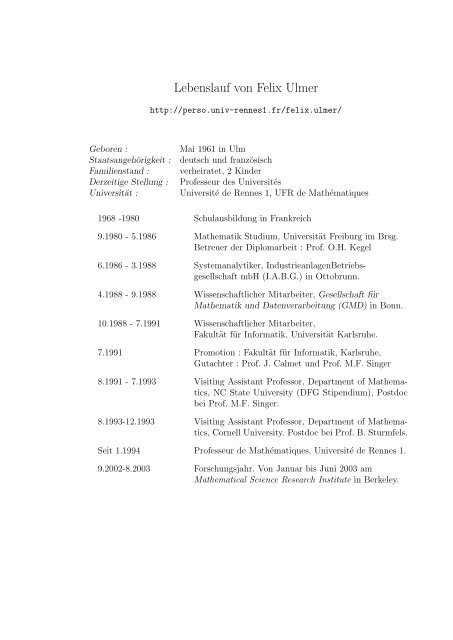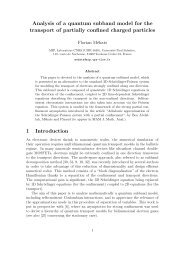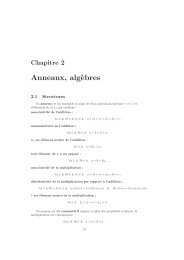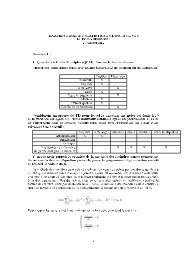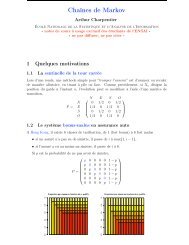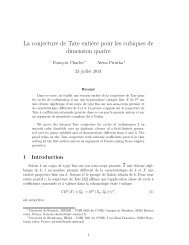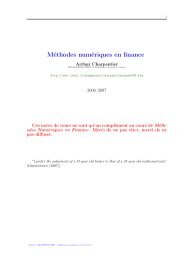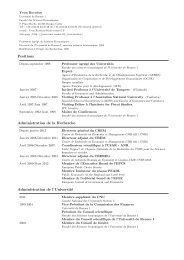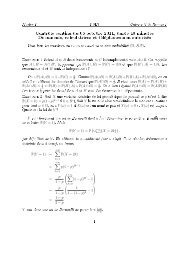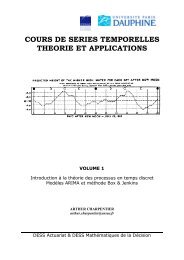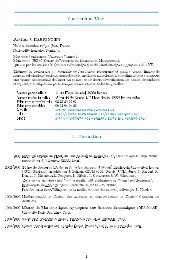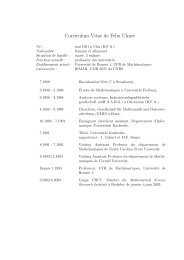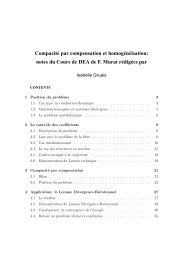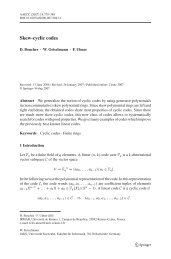Lebenslauf von Felix Ulmer - Université de Rennes 1
Lebenslauf von Felix Ulmer - Université de Rennes 1
Lebenslauf von Felix Ulmer - Université de Rennes 1
Sie wollen auch ein ePaper? Erhöhen Sie die Reichweite Ihrer Titel.
YUMPU macht aus Druck-PDFs automatisch weboptimierte ePaper, die Google liebt.
<strong>Lebenslauf</strong> <strong>von</strong> <strong>Felix</strong> <strong>Ulmer</strong><br />
http://perso.univ-rennes1.fr/felix.ulmer/<br />
Geboren :<br />
Staatsangehörigkeit :<br />
Familienstand :<br />
Derzeitige Stellung :<br />
Universität :<br />
Mai 1961 in Ulm<br />
<strong>de</strong>utsch und französisch<br />
verheiratet, 2 Kin<strong>de</strong>r<br />
Professeur <strong>de</strong>s Universités<br />
Université <strong>de</strong> <strong>Rennes</strong> 1, UFR <strong>de</strong> Mathématiques<br />
1968 -1980 Schulausbildung in Frankreich<br />
9.1980 - 5.1986 Mathematik Studium, Universität Freiburg im Brsg.<br />
Betreuer <strong>de</strong>r Diplomarbeit : Prof. O.H. Kegel<br />
6.1986 - 3.1988 Systemanalytiker, IndustrieanlagenBetriebsgesellschaft<br />
mbH (I.A.B.G.) in Ottobrunn.<br />
4.1988 - 9.1988 Wissenschaftlicher Mitarbeiter, Gesellschaft für<br />
Mathematik und Datenverarbeitung (GMD) in Bonn.<br />
10.1988 - 7.1991 Wissenschaftlicher Mitarbeiter,<br />
Fakultät für Informatik, Universität Karlsruhe.<br />
7.1991 Promotion : Fakultät für Informatik, Karlsruhe,<br />
Gutachter : Prof. J. Calmet und Prof. M.F. Singer<br />
8.1991 - 7.1993 Visiting Assistant Professor, Department of Mathematics,<br />
NC State University (DFG Stipendium), Postdoc<br />
bei Prof. M.F. Singer.<br />
8.1993-12.1993 Visiting Assistant Professor, Department of Mathematics,<br />
Cornell University. Postdoc bei Prof. B. Sturmfels.<br />
Seit 1.1994 Professeur <strong>de</strong> Mathématiques, Université <strong>de</strong> <strong>Rennes</strong> 1.<br />
9.2002-8.2003 Forschungsjahr. Von Januar bis Juni 2003 am<br />
Mathematical Science Research Institute in Berkeley.
1 Administrative Tätigkeiten<br />
– Gewähltes Mitglied <strong>de</strong>s Fakultätsrat (seit März 2013)<br />
– Gewähltes Mitglied <strong>de</strong>s Hochschulrates <strong>de</strong>r Deutsch-Französischen Hochschule<br />
(Seit Januar 2009)<br />
– Leiter <strong>de</strong>s mathematischen Forschungsinstituts IRMAR, Unité Mixte <strong>de</strong> Recherche<br />
6625 du CNRS, (2007–2011)<br />
– Mitglied <strong>de</strong>s Verwaltungsrat <strong>de</strong>r Université <strong>de</strong> <strong>Rennes</strong> 1 (2004–2008)<br />
– Pro-Dekan <strong>de</strong>r mathematischen Fakultät (2006 – 2007)<br />
– Mitglied <strong>de</strong>s Fakultätsrat (2004–2007)<br />
– Mitglied <strong>de</strong>s Wissenschaftsrat <strong>de</strong>s Forschungsinstituts IRMAR (2000–2004)<br />
2 Betreute Dissertationen<br />
– 2001 : Olivier CORMIER, “Résolution <strong>de</strong>s équations différentielles linéaires<br />
d’ordre 4 et 5 : application à la théorie <strong>de</strong> Galois classique”<br />
– 2002 : Axelle PERSON, “Solving homogeneous linear differential equations of<br />
or<strong>de</strong>r 4 in terms of equations of smaller or<strong>de</strong>r” (gemeinsame Betreuung mit<br />
M.F. Singer).<br />
– 2004 : Philippe GAILLARD, “Applications <strong>de</strong> la théorie <strong>de</strong> Galois différentielle<br />
aux équations différentielles linéaires d’ordre 4” (gemeinsame Betreuung mit<br />
M.F. Singer)<br />
– 2010 : Colas BARDAVID, “Schémas différentiels : approche géométrique et<br />
approche fonctorielle”<br />
– 2010 : Lionel CHAUSSADE, “Co<strong>de</strong>s correcteurs avec les polynômes tordus”
3 Forschung : Computeralgebra, Differential-Galoistheorie,<br />
Fehler korrigieren<strong>de</strong> Co<strong>de</strong>s<br />
Die Differentialgaloistheorie ist eine Verallgemeinerung <strong>de</strong>r klassischen Galoistheorie<br />
auf lineare Differentialgleichungen. Die Differentialgaloisgruppe ist eine lineare<br />
algebraische Gruppe, <strong>de</strong>finiert über <strong>de</strong>m Konstantenkörper <strong>de</strong>s Grundkörpers.<br />
Mit Hilfe <strong>de</strong>r Differentialgaloistheorie habe ich Algorithmen entworfen, die es<br />
erlauben Liouvillesche Lösungen <strong>von</strong> linearen Differentialgleichungen effizient zu<br />
berechnen [9,19]. Dabei han<strong>de</strong>lt es sich um Lösungen, die sich mit Hilfe <strong>von</strong> Funktionen<br />
<strong>de</strong>s Grundkörpers, Integralen, algebraischen Erweiterungen, <strong>de</strong>r Exponentialfunktion,<br />
Körperoperationen und Komposition schreiben lassen. Der Entwurf<br />
<strong>von</strong> Algorithmen basiert auf <strong>de</strong>r Darstellungstheorie und <strong>de</strong>r Invariantentheorie <strong>von</strong><br />
Gruppen. Zum Beispiel existiert genau dann eine Liouvillesche Lösung, wenn es<br />
eine polynomiale Semi-invariante <strong>de</strong>r Differential-Galoisgruppe gibt, die in lineare<br />
Faktoren zerfällt [15].<br />
A. Hurwitz konstruierte 1886 eine lineare Differentialgleichung dritter Ordnung,<br />
<strong>de</strong>ren Differentialgaloisgruppe die Gruppe P SL(2, 7) ist. Seine Metho<strong>de</strong> konnte ich<br />
in Zusammenarbeit mit Marius van <strong>de</strong>r Put in [11] auf beliebige endliche Gruppen<br />
verallgemeinern, was die Konstruktion <strong>von</strong> vielen Beispielen mit vorgegebenen endlichen<br />
Gruppen ermöglicht. In [5] wer<strong>de</strong>n Familien <strong>von</strong> Differentialgleichungen mit<br />
endlicher Differentialgaloisgruppe bzw Monodromiegruppe konstruiert. Dabei wird,<br />
in Umkehrung <strong>de</strong>r bekannten Arbeiten <strong>von</strong> Hitchin, eine algebraische Lösung <strong>de</strong>r<br />
Painlevé-Gleichung P VI zur Konstruktion herangezogen.<br />
Zyklische fehlerkorrigieren<strong>de</strong> Co<strong>de</strong>s über einen endlichem Körper F q entsprechen<br />
I<strong>de</strong>alen (g)/(X n − 1) <strong>de</strong>s Faktorrings F q [X]/(X n − 1) Zur Verallgemeinerung dieser<br />
Co<strong>de</strong>s betrachtet man ein Automorphismus θ <strong>von</strong> F q und <strong>de</strong>n zugehörigen Schiefpolynomring<br />
F q [X, θ]. Die Addition entspricht <strong>de</strong>r üblichen Addition <strong>von</strong> Polynomen<br />
und die Multiplikation entsteht aus <strong>de</strong>r Regel Xa = θ(a)X (a ∈ F q ). Diese Ringe<br />
sind rechts und links euklidische Ringe und einem Linksi<strong>de</strong>al (g)/(X n − 1) <strong>de</strong>s Faktorrings<br />
F q [X, θ]/(X n − 1) entspricht ein θ-zyklischer Co<strong>de</strong> C θ mit <strong>de</strong>r Eigenschaft<br />
(a 0 , a 1 , . . . , a n−1 ) ∈ C θ ⇒ (θ(a n−1 ), θ(a 0 ), θ(a 1 ), . . . , θ(a n−2 )) ∈ C θ .<br />
Da <strong>de</strong>r Ring F q [X, θ] für θ ≠ Id keine ein<strong>de</strong>utige Faktorzerlegung besitzt, ergeben<br />
sich so sehr viele interessante Co<strong>de</strong>s. Die Berechnung selbstdualer θ-zyklischer Co<strong>de</strong>s<br />
kann auf eine Gröbnerbasis Berrechnung zurück geführt wer<strong>de</strong>n, was zu <strong>de</strong>r Ent<strong>de</strong>ckung<br />
neuer selbstdualer Co<strong>de</strong>s vom Typ [56; 28; 15] 4 , [60; 30; 16] 4 , [62; 31; 17] 4 und<br />
[66; 33; 17] 4 mit einer besseren Fehler-Korrektur Kapazität als alle vorher bekannten<br />
Co<strong>de</strong>s dieser Typen führte [4].
Publikationen<br />
http://perso.univ-rennes1.fr/felix.ulmer/fu_papers.html<br />
0) Buch :<br />
[1] Théorie <strong>de</strong>s groupes, Editions Ellipses , collection références sciences, 192 pages,<br />
ISBN 9782729876319, (2012)<br />
1) Beiträge in Zeitschriften :<br />
[1] Self-dual skew co<strong>de</strong>s and factorization of skew polynomials (avec D. Boucher),<br />
Journal of Symbolic Computation, vol. 60, pp.47-61 (2014)<br />
[2] Linear co<strong>de</strong>s using skew polynomials with automorphisms and <strong>de</strong>rivations,<br />
(aver D. Boucher), Prépublication HAL 00597127<br />
À paraître dans : Designs, Co<strong>de</strong>s and Cryptography<br />
[3] Skew co<strong>de</strong>s of prescribed distance or rank (avec L. Chausa<strong>de</strong> et P. Loidreau)<br />
Designs, Co<strong>de</strong>s and Cryptography, vol. 50, 267-284 (2009)<br />
[4] Coding with skew polynomial rings (avec D. Boucher)<br />
Journal of Symbolic Computation, vol. 44, pp.1644-1656 (2009)<br />
Special issue on Gröbner Bases Techniques in Cryptography and Coding Theory<br />
[5] The Lamé family of connections on the projective line<br />
(avec F. Loray et M. van <strong>de</strong>r Put)<br />
Annales <strong>de</strong> la Faculté <strong>de</strong>s Sciences <strong>de</strong> Toulouse, vol. 17, 371-409 (2008)<br />
[6] Skew Constacyclic Co<strong>de</strong>s over Galois Rings (avec D. Boucher et P. Solé)<br />
Advances in Mathematics of Communications, vol. 2, pp. 273-292 (2008)<br />
[7] Skew Cyclic Co<strong>de</strong>s (avec D. Boucher et W. Geiselmann)<br />
Appl. Algebra in Eng. Comm. and Comp., vol. 18 pp. 379-389 (2007)<br />
[8] Note on Algebraic solutions of differential equations with known finite<br />
Galois group<br />
Appl. Algebra in Eng. Comm. and Comp. vol. 16 , pp. 205-218 (2005)<br />
[9] Liouvillian solutions of third or<strong>de</strong>r differential equations<br />
Journal of Symbolic Computation vol. 36, pp. 855-889 (2003)<br />
[10] Linear Differential Operators for Polynomial Equations<br />
(avec O. Cormier, M.F. Singer et B.M. Trager).<br />
Journal of Symbolic Computation , vol. 34, pp. 355-398 (2002)<br />
[11] Differential equations and finite groups (avec M. van <strong>de</strong>r Put)<br />
Journal of Algebra, vol. 226, pp. 920-966 (2000)
[12] How to Solve Linear Differential Equations : An Outline.<br />
Programming and Computer Software, vol. 26, pp. 17-22 (2000)<br />
[13] Liouvillian solutions of linear differential equations of or<strong>de</strong>r three and higher<br />
(avec M. van Hoeij, J.F. Ragot et J.A. Weil)<br />
Journal of Symbolic Computation, vol. 28, pp. 589-609 (1999)<br />
[14] Constructing a Third Or<strong>de</strong>r Linear Differential Equation (avec W. Geiselman).<br />
Theoretical Computer Science, vol. 187, pp. 3-6 (1997)<br />
[15] Linear Differential Equations and Products of Linear Forms (avec M.F. Singer)<br />
J. of Pure and Applied Algebra, vol. 117-118 , pp. 353-379 (1997)<br />
[16] Note on Kovacic’s algorithm (avec J.A. Weil)<br />
Journal of Symbolic Computation, vol. 22, pp. 179-200 (1996)<br />
[17] Necessary conditions for liouvillian solutions of (third or<strong>de</strong>r) linear differential<br />
equations (avec M.F. Singer)<br />
Appl. Algebra in Eng. Comm. and Comp., vol. 6, pp. 1-22 (1995)<br />
[18] Irreducible linear differential equations of prime or<strong>de</strong>r<br />
Journal of Symbolic Computation, vol. 18, pp. 385-401 (1994)<br />
[19] Liouvillian and algebraic solutions of second and third or<strong>de</strong>r linear differential<br />
equations (avec M.F. Singer)<br />
Journal of Symbolic Computation, vol. 16, pp. 37-73 (1993)<br />
[20] Galois groups of second and third or<strong>de</strong>r linear differential equations<br />
(avec M.F. Singer)<br />
Journal of Symbolic Computation, vol. 16, pp. 1-36 (1993)<br />
[21] On liouvillian solutions of linear differential equations<br />
Appl. Algebra in Eng. Comm. and Comp., vol. 2, pp. 171-193 (1992)<br />
2) Beiträge in Tagungsbän<strong>de</strong>n<br />
[1] A note on the dual co<strong>de</strong>s of module skew co<strong>de</strong>s (avec D. Boucher)<br />
Proc. 13th IMA Conference of Cryptography and Coding, Oxford (2011),<br />
Lecture Notes in Computer Science, 7089, 23–243 (2011)<br />
[2] Key exchange and encryption schemes based on non-commutative skew polynomials<br />
(avec D. Boucher, P. Gaborit, W. Geiselmann, O. Ruatta), Proceedings<br />
PQCrypto, 3rd Int. Workshop on Post-Quantum Cryptography, Darmstadt,<br />
Lecture Notes in Computer Science, 6061, 126-141 (2010).<br />
[3] Co<strong>de</strong>s as modules over skew polynomial rings (avec D. Boucher),<br />
Proceedings 12th IMA conference on Cryptography and Coding, Cirencester,<br />
Lecture Notes in Computer Science, 5921, 38-55 (2009)
[4] Fourth or<strong>de</strong>r linear differential equations with imprimitive group,(avec D. Boucher<br />
et P. Gaillard), Proceedings ISSAC, Phila<strong>de</strong>lphia<br />
ACM Press, pp. 45-49 (2003)<br />
[5] Computing the Galois group of a polynomial using linear differential equations,<br />
(avec O. Cormier et M.F. Singer). Proceedings of ISSAC, St Andrews<br />
ACM Press, pp. 78-85 (2000)<br />
[6] On a third or<strong>de</strong>r linear differential equations whose differential Galois group<br />
is the simple group of 168 elements (avec M.F. Singer),<br />
In : Proceedings of AAECC, Puerto Rico<br />
Springer Lectures Notes in Computer Science 673, pp. 316-324 (1993)<br />
[7] Liouvillian solutions of third or<strong>de</strong>r linear differential equations : New bounds<br />
and necessary conditions (avec M.F. Singer), Proceedings ISSAC Berkeley<br />
ACM Press, pp. 57-62 (1992)<br />
[8] On algebraic solutions of linear differential equations with primitive unimodular<br />
Galois group, In : Proceedings of AAECC-9, New Orleans<br />
Springer Lectures Notes in Computer Science 539, pp. 446-455 (1991)<br />
[9] On liouvillian solutions of homogeneous linear differential equations<br />
(avec J. Calmet), In : Proceedings of ISSAC, Tokyo 1990<br />
ACM Press, pp. 236-243 (1990)<br />
3) An<strong>de</strong>re Beiträge :<br />
[1] Some methods to solve linear differential equations in closed form (avec J.A. Weil),<br />
London Math. Soc. Lecture Note Series, No. 357, pp. 83–110 (2008)<br />
[2] Fehler korrigieren<strong>de</strong> Co<strong>de</strong>s, Son<strong>de</strong>rheft zum Jahr <strong>de</strong>r Mathematik 2008,<br />
Computeralgebra Rundbrief GI-DMV-GAMM, April, 32-34 (2008)<br />
(http ://www.fachgruppe-computeralgebra.<strong>de</strong>/JdM/)<br />
[3] Note on Kovacic’s algorithm (avec J.A. Weil),<br />
ACM SIGSAM Bulletin, Volume 29 , Issue 2, 10-11 (April 1995)<br />
[4] Entwurf <strong>von</strong> Algorithmen zur Berechnung Liouvillescher Lösungen <strong>von</strong> linearen<br />
gewöhnlichen Differentialgleichungen, Thèse Universität Karlsruhe 1991,<br />
Verlag Dr. Kovac, Hamburg 1991, ISBN 3-925630-93-7


